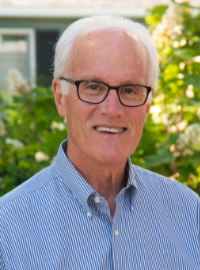Session one: The Role of Simulation Modeling in Tobacco Research and Regulation: Yesterday, Today and Tomorrow
- 12:05 PM — 12:10 PM: Welcoming Remarks (Day One) with Rafael Meza, PhD and David Levy, PhD
- ❏ Watch this presentation
- 12:10 PM — 12:40 PM: Keynote Lecture with Kenneth E. Warner, PhD
- ❏ Watch this presentation❏ Slides from this presentation
- About this presenter and presentation +
 Kenneth E. Warner, PhD
Kenneth E. Warner, PhD- “The Role of Simulation Modeling in Tobacco Research and Regulation: Yesterday, Today, and Tomorrow”
- Introducing the symposium, this presentation will open with a brief description of the nature of simulation modeling and then consider its role in tobacco research and regulation. While a wide variety of modeling approaches can be used to evaluate the effects of variables, including policies, on outcomes of interest (such as smoking prevalence), simulation models offer the most flexibility to incorporate as much complexity as necessary (and possible) to describe such processes. Simulations work with both known parameter values (for example, the price elasticity of demand for cigarettes) and those with uncertain values (such as smokers’ responses to a ban on menthol in combusted tobacco products). The latter, among the most challenging but potentially most useful simulations, are addressed by Monte Carlo and sensitivity analyses (varying the values of important variables to assess the range of potential outcomes they may produce). This talk will illustrate past applications of simulation modeling in tobacco control research, noting the intended or possible regulatory applications of that work. It will then turn to contemporary modeling, including the work of CAsToR, considering its potential utility in assisting in the development of tobacco regulation. The presentation will conclude by contemplating the future application of simulation in the development or evaluation of tobacco regulations.
- Kenneth E. Warner, PhD
- University of Michigan: Avedis Donabedian Distinguished University Professor Emeritus of Public Health; Professor Emeritus of Health Management & Policy; Dean Emeritus of Public Health
- Profile: sph.umich.edu
- Kenneth E. Warner is the Avedis Donabedian Distinguished University Professor Emeritus of Public Health and Dean Emeritus at the University of Michigan School of Public Health, where he was on the faculty from 1972-2017. He served as Dean from 2005-2010 and as a department chair from 1982-88 and 1992-95. An economist, Dr. Warner earned his A.B. degree from Dartmouth College and M.Phil. and Ph.D. degrees from Yale University.
- Presented in over 300 professional publications, including 7 books, Dr. Warner’s research has focused on tobacco and health policy. Dr. Warner served as the World Bank’s representative to negotiations on the Framework Convention on Tobacco Control. He also served as the Senior Scientific Editor of the 25th anniversary Surgeon General’s report on smoking and health. During 2004-05 he was President of the Society for Research on Nicotine and Tobacco. He was a founding member of the Board of Directors of the Truth Initiative. Currently, he is a member of the FDA Tobacco Products Scientific Advisory Committee and an elected member of the Board of Trustees of Northwestern Michigan College. Dr. Warner’s honors and awards include: the Surgeon General’s Medallion, conferred by Dr. C. Everett Koop in 1989; election to membership in the National Academy of Medicine in 1996; a Luther L. Terry Award for Exemplary Leadership in Tobacco Control in 2003; the Alton Ochsner Award Relating Smoking and Disease in 2010; and the triennial Doll-Wynder Award from the Society for Research on Nicotine and Tobacco in 2017.
- 12:40 PM — 1:10 PM: Keynote Lecture with Mitch Zeller, JD
- ❏ Watch this presentation❏ Slides from this presentation
- About this presenter and presentation +
 Mitch Zeller, JD
Mitch Zeller, JD- “Simulation Modeling and How it Informs the Work of FDA’s Center for Tobacco Products (CTP)”
- FDA’s Center for Tobacco Products Director Mitch Zeller, J.D., will discuss how simulation modeling is used as a tool to inform the Center’s work and decision-making process. Real-world examples will be outlined showing how simulation modeling helps the Center assess the potential impacts of new tobacco products and new regulatory actions on measures of tobacco product use, morbidity, and mortality.
- Mitch Zeller, JD
- United States Food and Drug Administration: Director, Center for Tobacco Products
- As director of the Center for Tobacco Products, Mitch Zeller leads FDA's efforts to reduce disease and death from tobacco use and bring previously unavailable information about its dangers to light. Zeller is dedicated to carrying out CTP's charge to reduce the harm from all tobacco products across the entire population—with a focus on how and why people start, stop, or start using these products again.
- Mitch Zeller, J.D., became director of the FDA's Center for Tobacco Products in March 2013. The mission of CTP—established by enactment of the 2009 Family Smoking Prevention and Tobacco Control Act—is “to make tobacco-related death and disease part of America's past, not America's future, and, by doing so, ensure a healthier life for every American family.” “Today, FDA has an unprecedented opportunity to use the tools in the Tobacco Control Act,” Zeller said. “Product regulation is a powerful component of a comprehensive strategy to reduce the death and disease from tobacco use. We will marshal the science to support new policies to help combat the leading cause of preventable disease and death in the United States,” he added. Zeller, a graduate of Dartmouth College and the American University Washington College of Law, has been working on FDA issues for more than 30 years. He began his career as a public interest attorney in 1982 at the Center for Science in the Public Interest (CSPI). In 1988, Zeller left CSPI to become counsel to the Human Resources and Intergovernmental Relations Subcommittee of the House of Representatives Government Operations Committee where he conducted oversight of enforcement of federal health and safety laws. In 1993, Zeller joined the staff of then-FDA Commissioner Dr. David Kessler, M.D. What began as a two-week assignment by Kessler in 1994 to examine the practices of the tobacco industry led to his serving as associate commissioner and director of FDA's first Office of Tobacco Programs. Instrumental in crafting the agency's 1996 tobacco regulations, Zeller also represented FDA before Congress, federal and state agencies. Zeller also served as an official U.S. delegate to the World Health Organization (WHO) Working Group for the Framework Convention on Tobacco Control. In 2000, Zeller left FDA to continue his work for tobacco control as executive vice president of the American Legacy Foundation. His responsibilities there included marketing, communications, strategic partnerships, and creating the foundation's first Office of Policy and Government Relations. In 2002, Zeller joined Pinney Associates where, as senior vice president, he provided strategic planning and communications advice on domestic and global public health policy issues involving the treatment of tobacco dependence and the regulation of tobacco products and pharmaceuticals.
- 1:10 PM — 1:30 PM: Q & A with Kenneth E. Warner, PhD and Mitch Zeller, JD
- ❏ Watch this presentation
- 1:30 PM — 1:40 PM: Break
Session two: Where We Are Now - Brief Review of the Landscape of Computational Models in Tobacco Research
- 1:40 PM — 1:50 PM: Session Introduction with Rafael Meza, PhD
- ❏ Watch this presentation
- 1:50 PM — 2:10 PM: “The Use of Macrosimulation Models in Tobacco Research” with David Mendez, PhD
- ❏ Watch this presentation❏ Slides from this presentation
- About this presenter and presentation +
 David Mendez, PhD
David Mendez, PhD- “The Use of Macrosimulation Models in Tobacco Research”
- This talk will present a simulation modeling framework frequently used in simulation analyses in tobacco control. We will discuss the basic architecture of compartmental or aggregate models and their implementation as macrosimulation models. We will examine these models within the context of tobacco research and tobacco regulatory science. We will also present several modeling examples drawn from the tobacco research field.
- David Mendez, PhD
- University of Michigan: Associate Professor
- Dr. David Mendez is an Associate Professor in the Department of Health Management and Policy at the University of Michigan. His research focuses on modeling trends of cigarette smoking cessation or switching to e-cigarettes. Dr. Mendez’s research also investigates the financial implications of these trends, with specific focus on tobacco control in the United States.
- 2:10 PM — 2:30 PM: “Tobacco Town: A Computational Model for Exploring Environmental Effects of Retail Tobacco Control Policies” with Douglas Luke, PhD
- ❏ Watch this presentation❏ Slides from this presentation
- About this presenter and presentation +
 Douglas Luke, PhD
Douglas Luke, PhD- “Tobacco Town: A Computational Model for Exploring Environmental Effects of Retail Tobacco Control Policies”
- Agent-based models are a form of computational model that simulates actions of autonomous agents as well as their interactions with other agents and with their social or physical environments. Agent-based models have an important history of use in public health for studying infectious diseases, but more recently have been applied to chronic disease and policy research, including tobacco control. In this presentation, we will describe Tobacco Town, a series of modeling studies designed as virtual policy laboratories that help us understand the underlying mechanisms of policy efforts to reduce the density of tobacco retailers in cities and communities. We will present Tobacco Town results that suggest policies can be tailored to the specific environmental characteristics of the cities where they will be implemented. In addition, we will discuss the particular advantages of agent-based modeling for tobacco control policy research, including: 1) mechanism identification; 2) data gap identification; 3) policy effects with strong social network and/or physical environment components; and 4) examination of policy-relevant health disparities.
- Douglas Luke, PhD
- Brown School at Washington University in St. Louis: Irving Louis Horowitz Professor in Social Policy
- Douglas Luke is a leading researcher in the areas of public health policy, systems science and tobacco control. Luke directs work focused primarily on the evaluation, dissemination and implementation of evidence-based public health policies.Over the past decade, Luke has used systems science methods, especially social network analysis and agent-based modeling, to address important public health problems. He published the first review papers on network analysis in public health in 2007, and on systems science methods in public health in 2012. He has written books on multilevel modeling and network analysis. Under Luke’s leadership, the Center for Public Health Systems Science has used network analysis to study diffusion of scientific innovations, to model the formation of organizational collaborations, and to study the relationship of mentoring to future scientific collaboration.In addition to his appointment at the Brown School, Luke is a member of the Institute of Clinical and Translational Science and a founding member of the Washington University Network of Dissemination and Implementation Researchers. In addition, he served on an Institute of Medicine panel that produced a national report on the use of agent-based modeling for tobacco regulatory science.
- 2:30 PM — 2:40 PM: Break
- 2:40 PM — 3:00 PM: “Population Modeling in Tobacco Regulation to Quantify the Risks and Benefits to the Population as a Whole” with Esther Salazar, PhD
- ❏ Watch this presentation❏ Slides from this presentation
- About this presenter and presentation +
 Esther Salazar, PhD
Esther Salazar, PhD- “Population Modeling in Tobacco Regulation to Quantify the Risks and Benefits to the Population as a Whole”
- Tobacco use remains the leading cause of preventable death and disease in the United States (US). The Family Smoking Prevention and Tobacco Control Act (TCA), signed into law on June 22, 2009, gives FDA the authority to regulate tobacco products. Under the TCA, FDA has the authority to require premarket review of new tobacco products, authorize the marketing of modified risk tobacco products, and take regulatory actions including the development of product standards, such as reducing or eliminating constituents in tobacco products. This presentation will describe examples of modeling strategies used in tobacco regulation to quantify the impact of regulatory actions on population health. In particular, we will focus on a dynamic population modeling framework FDA has used to project the impact of changes in tobacco use behavior on prevalence, morbidity and mortality on the US population, including users and non-users of tobacco products. We will also point out some challenges regarding the construction of input model parameters and assumptions needed to populate these models, such as estimation of tobacco use initiation, cessation, switching and relapse, cause-specific mortality risk for new products, and changes in transition probabilities for specific regulatory scenarios.
- Esther Salazar, PhD
- United States Food and Drug Administration: Lead Mathematical Statistician, Center for Tobacco Products, Office of Science
- Dr. Esther Salazar is a Lead Mathematical Statistician in the Center for Tobacco Products (CTP) at the U.S. Food and Drug Administration (FDA). Her areas of expertise are health effects of tobacco product use, population modeling, survey data analysis, text mining, machine learning techniques for big data, and Bayesian analysis. At the FDA, Dr. Salazar has been actively collaborating with modeling and simulation research activities to investigate the morbidity and mortality effects of tobacco use in the U.S. population. Before joining the FDA in 2015, Dr. Salazar was a Research Assistant Professor in the Electrical and Computer Engineering Department at Duke University. She also has training as Postdoctoral Fellow in the Department of Statistical Science at Duke University and the Statistical and Applied Mathematical Sciences Institute (SAMSI) in North Carolina.
- 3:00 PM — 3:20 PM: “Tobacco and Comorbid Mental Health Conditions: a Modeling Challenge” with Jamie Tam, PhD
- ❏ Watch this presentation❏ Slides from this presentation
- About this presenter and presentation +
 Jamie Tam, PhD
Jamie Tam, PhD- Jamie Tam, PhD
- Yale University: Assistant Professor
- Jamie Tam is an Assistant Professor in the Department of Health Policy and Management at the Yale School of Public Health. Dr. Tam conducts research on the effects of tobacco regulations, with a special focus on the use of systems science methods to understand tobacco use disparities, including populations with mental health conditions. Her recent work examines the implications of the relationship between smoking and depression for mortality outcomes, and uses modeling methods to evaluate interventions that address their co-occurrence. Dr. Tam has developed computational models that simulate the effects of policies on smoking and population health in the United States, and launched a web-based interface that allows users to explore the potential health effects of different tobacco control policies. Dr. Tam was previously a NAM Tobacco Regulatory Science Fellow at the FDA Center for Tobacco Products and is broadly interested in domestic and global tobacco control issues; Her other projects have considered the effects of demographic changes on smoking prevalence, longitudinal transitions between tobacco products, and youth exposure to nicotine through electronic cigarettes.
- 3:20 PM — 3:55 PM: Panel Discussion with David Mendez, PhD, Douglas Luke, PhD, Esther Salazar, PhD and Jamie Tam, PhD
- ❏ Watch this presentation
- Moderated by Rafael Meza, PhD
- 3:55 PM — 4:00 PM: Closing Remarks with Rafael Meza, PhD and David Levy, PhD